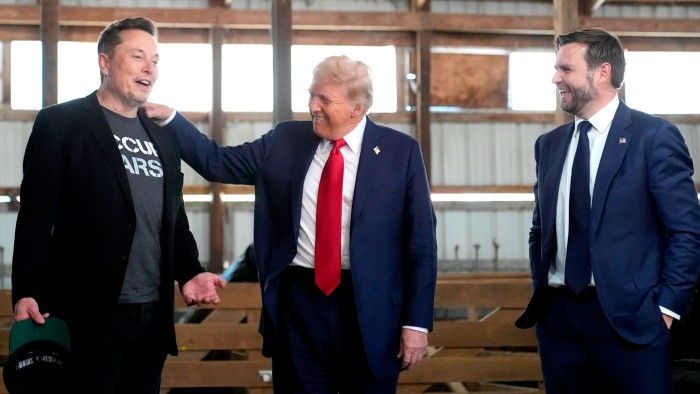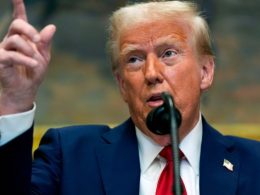Unlock the White House Watch newsletter for free
Your guide to what the 2024 US election means for Washington and the world
As Donald Trump’s administration crashes through norm after norm of decent governance, a terrifying belief is emerging within it that the courts are illegitimate if they try to stand in his way. This past week, Trump himself, his vice-president JD Vance and his chief crony Elon Musk all inveighed against inconvenient federal judges. With the Republican-controlled legislative branch largely absenting itself from oversight, the lack of a judicial check on executive power is a hideous proposition.
The trade world knows the feeling. A great edifice of international law, multilateral and regional, has been built up since the second world war and particularly since the creation of the World Trade Organization in 1995. While Trump’s threat this week to bring back and extend his steel and aluminium tariffs merely violates WTO laws, his reciprocity plan to equalise US tariffs with each trading partner (and apparently to add extra penalties at whim) is a wholesale destruction of the equal treatment “most-favoured nation” (MFN) principle that underpins the entire system.
The supposed international rules-based order in trade has always been disturbingly dependent on self-restraint, particularly regarding the use of national security loopholes. Under both Trump and Joe Biden’s administrations, that restraint has rapidly weakened. Trump is now also testing domestic US legal constraints on trade policy. At home and abroad, the real counterweight must come from organised political opposition together with economic blowback from his own actions, not the law.
I wonder if Biden administration officials still privately think it was such a great idea to keep in place (even if suspending) Trump’s WTO-illegal “Section 232” national security tariffs on steel and aluminium. He is now extending them. Maybe I’ve missed something, but driving multilateralism towards the edge of the cliff via an economically wrong-headed action on behalf of an industry with less than 0.1 per cent of the US workforce doesn’t seem like far-sighted economic statecraft to me.
Let’s be fair: the weakness of WTO rules isn’t all the US’s fault. A dispute settlement system under a treaty-based intergovernmental organisation isn’t a supreme court. Its limited powers — to authorise trade retaliation — work properly when they accompany negotiations rather than substitute for them. The WTO negotiating function only sporadically operates, not least because India routinely blocks progress in talks.
Restoring credibility to rules-based trade will take effort. Multilateralism needs to earn its legitimacy anew by showing it can deliver. Bringing WTO cases against the US must be part of a wider campaign by governments to stick together, retaliate judiciously and, above all, maintain and extend open trade among themselves.
You would hope domestic US trade law might bind Trump’s hands somewhat more. It’s conducted through binding law in established processes, including the non-partisan International Trade Commission federal agency whose decisions can be appealed against at the Court of International Trade (CIT). On the legislative side, Congress — although it delegates negotiating authority to the president — has to agree traditional preferential trade agreements.
But like the casual invocation of the national security loophole at the WTO, Trump can bypass these constraints by using emergency presidential powers. The 25 per cent tariffs he ordered and then suspended last week on Canada and Mexico relied on the International Emergency Economic Powers Act, which is supposed to be reserved for periods of intense conflict rather than some made-up nonsense about fentanyl crossing the Canadian border.
To avoid having to take his reciprocal tariff plan through Congress, Trump could use the IEEPA again, or perhaps the little-known Section 338 of a law from 1930 that predates the MFN principle. The courts could stop this, but the CIT has traditionally deferred to presidential authority, especially when foreign policy issues are involved, and there’s a high bar for federal district courts to issue injunctions against tariffs. Even if they do, the US Supreme Court has shown itself unwilling to inconvenience Trump.
It will fall to foreign and domestic proponents of open rules-based trade to make a substantive political case against the misuse of trade tools, argue it publicly and, where necessary, back it up with their actions. Unfortunately, Trump’s domestic opponents are weakened by their own complicity. It’s harder for the Democrats to oppose wholesale protectionism given they ridiculously colluded with Trump imposing tariffs based on the national security risk of buying European steel. Internationally, it’s also hard for the likes of Canada to say they are strictly adhering to the rule of law when last October Ottawa followed the US in imposing WTO-suspect tariffs on Chinese electric vehicles at Biden’s behest.
But there’s no way round it. The courts are not enough. Neither domestically nor internationally is the judiciary likely to save rules-based trade from Trump. The US president has identified multiple security loopholes you could drive one of Musk’s Cybertrucks through. Only the visible economic or financial market costs of protectionism, together with public opinion responding to a coherent argument about the dangers of trashing the trading system, are likely to give him any pause.
Source link









